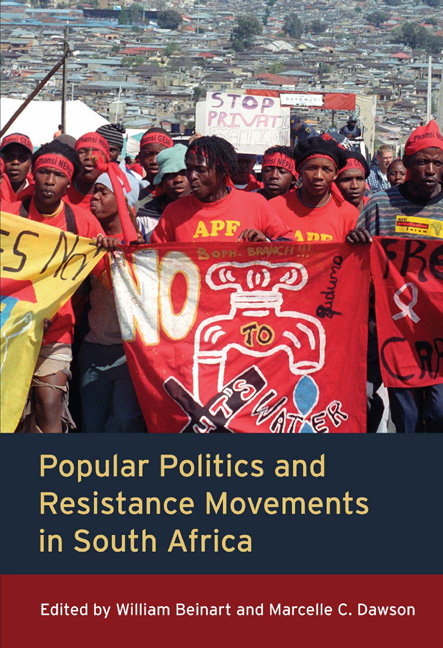Book contents
- Frontmatter
- Contents
- Contributors
- List of Abbreviations and Acronyms
- 1 Popular politics and resistance movements in South Africa, 1970–2008
- 2 The Durban strikes of 1973: Political identities and the management of protest
- 3 ‘There's more to it than slurp and burp’: The Fatti's & Moni's strike and the use of boycotts in mass resistance in Cape Town
- 4 The role of the African National Congress in popular protest during the township uprisings, 1984–1989
- 5 Strategies of struggle: The Nelson Mandela campaign
- 6 From removals to reform: Land struggles in Weenen in KwaZulu-Natal, South Africa
- 7 From popular resistance to populist politics in the Transkei
- 8 ‘It's a beautiful struggle’: Siyayinqoba/Beat it! and the HIV/AIDS treatment struggle on South African television
- 9 The Nelson Mandela Museum and the tyranny of political symbols
- 10 Black nurses’ strikes at Baragwanath Hospital, Soweto, 1948–2007
- 11 The ‘New Struggle’: Resources, networks and the formation of the Treatment Action Campaign (TAC) 1994–1998
- 12 New social movements as civil society: The case of past and present Soweto
- 13 ‘Phansi Privatisation! Phansi!’: The Anti-Privatisation Forum and ideology in social movements
- Endnotes
- Bibliography
- Index
3 - ‘There's more to it than slurp and burp’: The Fatti's & Moni's strike and the use of boycotts in mass resistance in Cape Town
Published online by Cambridge University Press: 21 April 2018
- Frontmatter
- Contents
- Contributors
- List of Abbreviations and Acronyms
- 1 Popular politics and resistance movements in South Africa, 1970–2008
- 2 The Durban strikes of 1973: Political identities and the management of protest
- 3 ‘There's more to it than slurp and burp’: The Fatti's & Moni's strike and the use of boycotts in mass resistance in Cape Town
- 4 The role of the African National Congress in popular protest during the township uprisings, 1984–1989
- 5 Strategies of struggle: The Nelson Mandela campaign
- 6 From removals to reform: Land struggles in Weenen in KwaZulu-Natal, South Africa
- 7 From popular resistance to populist politics in the Transkei
- 8 ‘It's a beautiful struggle’: Siyayinqoba/Beat it! and the HIV/AIDS treatment struggle on South African television
- 9 The Nelson Mandela Museum and the tyranny of political symbols
- 10 Black nurses’ strikes at Baragwanath Hospital, Soweto, 1948–2007
- 11 The ‘New Struggle’: Resources, networks and the formation of the Treatment Action Campaign (TAC) 1994–1998
- 12 New social movements as civil society: The case of past and present Soweto
- 13 ‘Phansi Privatisation! Phansi!’: The Anti-Privatisation Forum and ideology in social movements
- Endnotes
- Bibliography
- Index
Summary
Introduction
Mass resistance in the Western Cape gained momentum in 1979 after workers at the Fatti's & Moni's pasta and bread factory in Cape Town stopped work and organised a boycott of the company's products. Yet this was not the first boycott initiated by a trade union during this period. Five months earlier, the National Union of Motor Assembly and Rubber Workers of South Africa launched a consumer boycott against Eveready South Africa, a battery-manufacturing company, after its management dismissed 230 coloured female workers for striking at its Port Elizabeth factory. While the Eveready boycott garnered an extensive international following, it failed to force the company to settle the dispute – neither receiving the widespread national publicity nor generating the momentum that followed the Fatti's & Moni's campaign.
The Fatti's & Moni's protest marked a watershed in the history of South African labour protests, highlighted the strategic viability of boycotting as a tool to challenge state dominance and created the impetus for anti-apartheid organisational development in South Africa during the early 1980s. At the time, Ian Morgan, an investigative journalist, argued that ‘not since the Potato Boycott of the Fifties had war been waged against a company's products and its image for so long and so successfully’. While Morgan is inaccurate in his analysis of the boycott's relative length – the Eveready boycott, for example, lasted more than eight months – he is precise in his assessment of the boycott's achievement. The Fatti's & Moni's protest formed part of a larger debate concerning the desirability of trade unions linking shopfloor protests to other community struggles. In the early years of their growth, from around 1972, the new independent black unions had limited legal recognition and were subject to state repression and employer hostility. They often decided to build shopfloor organisation before considering broader political struggles. Political activity was seen by some unionists to endanger still-fragile organisations and to expose leaders to retribution by the state. The Fatti's & Moni's strike, however, led by the Food and Canning Workers Union (FCWU), used the consumer boycott as a vehicle to forge crucial alliances between trade unions and burgeoning community groups. This helped to ignite a robust debate within the labour movement over its role in the broader liberation struggle.
- Type
- Chapter
- Information
- Publisher: Wits University PressPrint publication year: 2010



